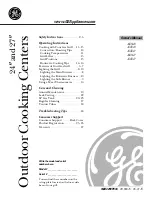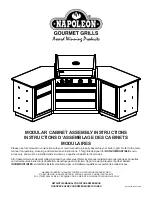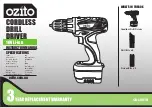
NOTE: Do not change gears when tool is running. If you are having trouble changing
gears, make sure that the dual range gear button is either completely pushed forward or
completely pushed back.
Keyless Chuck
To insert a drill bit or other accessory:
1. Grasp the chuck collar (containing the two orange buttons) with one hand and use your
other hand to rotate the chuck in the counterclockwise direction, as viewed from the
chuck end.
2. Insert the bit or other accessory fully into the chuck, and tighten securely by holding the
collar behind the chuck (containing the two orange buttons) and rotating the chuck in
the clockwise direction as viewed from the chuck end.
WARNING: Do not attempt to tighten drill bits (or any other accessory) by gripping the
front part of the chuck and turning the tool on. Damage to the chuck and personal injury
may occur when changing accessories.
Removable Chuck with Quick Connect
TM
Bit Change System - Figure 6
Another unique feature of your drill is the ability to remove the chuck quickly and easily.
This allows for a drill bit to be in the keyless chuck, while another accessory such as a
screwdriver bit, can be inserted into the Quick Connect
TM
hex shaft at the same time.
To remove the chuck:
1. Grasp the drill and depress the two orange buttons on the chuck collar as shown in
Figure 6.
2. With the buttons depressed, pull straight out.
To replace the chuck:
1. Push the quick connect chuck straight on with a slight twisting motion until you hear it
click into place.
To insert a screwdriver bit into the Quick Connect
TM
hex shaft, push the bit in until you hear
it click into place. To remove the bit, hold the drill as shown in Figure 7. Push in evenly on
the spring loaded disc with two fingers and pull the bit straight out.
Screw Driving
For driving fasteners, the reversing button should be pushed to the left. Use reverse (button
pushed to the right) for removing fasteners. When moving from forward to reverse, or vice
versa, always release the trigger switch first.
On Board Bit Storage
A bit storage slot is built-in to the area just above the battery.
Drilling
• Use sharp drill bits only.
• Support and secure work properly, as instructed in the Safety Instructions.
• Use appropriate and required safety equipment, as instructed in the Safety Instructions.
• Secure and maintain work area, as instructed in the Safety Instructions.
• Run the drill very slowly, using light pressure, until the hole is started enough to keep the
drill bit from slipping out of it.
• Apply pressure in a straight line with the bit. Use enough pressure to keep the bit biting
but not so much as to stall the motor or deflect the bit.
• Hold the drill firmly with one hand on the grip and the other hand on the bottom of the
battery pack to control its twisting action.
• DO NOT CLICK THE TRIGGER OF A STALLED DRILL OFF AND ON IN AN ATTEMPT
TO START IT. DAMAGE TO THE DRILL CAN RESULT.
• Minimize stalling on breakthrough by reducing pressure and slowly drilling through the
last part of the hole.
• Keep the motor running while pulling the bit out of a drilled hole. This will help reduce
jamming.
• Make sure switch turns drill on and off.
WARNING: It is important to support the work properly and to hold the drill firmly to
prevent loss of control which could cause personal injury. If you have any questions on how
to properly operate tool, call: 1-800-544-6986.
Drilling in Wood
Holes in wood can be made with the same twist drill bits used for metal or with spade bits.
These bits should be sharp and should be pulled out frequently when drilling to clear chips
from the flutes.
Drilling in Metal
Use a cutting lubricant when drilling metals. The exceptions are cast iron and brass which
should be drilled dry. The cutting lubricants that work best are sulfurized cutting oil or lard
oil.
Drilling in Masonry
Use carbide tipped masonry bits. Refer to Drilling section. Keep even force on the drill but
not so much that you crack the brittle material. A smooth, even flow of dust indicates the
proper drilling rate.
Maintenance
Use only mild soap and damp cloth to clean the tool. Never let any liquid get inside the tool;
never immerse any part of the tool into a liquid.
An occasional application of a household oil to the Quick Connect
TM
hex shaft will help
prevent rust.
IMPORTANT: To assure product SAFETY and RELIABILITY, repairs, maintenance and
adjustment (other than those listed in this manual) should be performed by authorized
service centers or other qualified service organizations, always using identical
replacement parts.
The RBRC™ Seal
The RBRC™ (Rechargeable Battery Recycling Corporation)
Seal on the nickel-cadmium battery (or battery pack) indicates that the costs to
recycle the battery (or battery pack) at the end of its useful life have already been paid by
Black & Decker. In some areas, it is illegal to place spent nickel-cadmium batteries in the
trash or municipal solid waste stream and the RBRC program provides an environmentally
conscious alternative.
RBRC in cooperation with Black & Decker and other battery users, has established
programs in the United States and Canada to facilitate the collection of spent nickel-
cadmium batteries. Help protect our environment and conserve natural resources by
returning the spent nickel-cadmium battery to an authorized Black & Decker service center
or to your local retailer for recycling. You may also contact your local recycling center for
information on where to drop off the spent battery, or call 1-800-8-BATTERY.
Accessories
Recommended accessories for use with your tool are available from your local dealer or
authorized service center. If you need assistance regarding accessories, please call:
1-800-544-6986.
WARNING: The use of any accessory not recommended for use with this tool could be
hazardous.
The following accessories should be used only in the sizes specified below:
BITS, METAL DRILLING – Up to 3/8" (9.5mm); BITS, MASONRY DRILLING – Up to 3/8"
(9.5mm); WOOD DRILLING – Up to 1/2" (12.7mm).
Service Information
All Black & Decker Service Centers are staffed with trained personnel to provide customers
with efficient and reliable power tool service. Whether you need technical advice, repair, or
genuine factory replacement parts, contact the Black & Decker location nearest you. To find
your local service location, refer to the yellow page directory under "Tools—Electric" or call:
1-800-544-6986 or visit www.blackanddecker.com
Full Two-Year Home Use Warranty
Black & Decker (U.S.) Inc. warrants this product for two years against any defects in
material or workmanship. The defective product will be replaced or repaired at no charge in
either of two ways.
The first, which will result in exchanges only, is to return the product to the retailer from
whom it was purchased (provided that the store is a participating retailer). Returns should
be made within the time period of the retailer’s policy for exchanges (usually 30 to 90 days
after the sale). Proof of purchase may be required. Please check with the retailer for their
specific return policy regarding returns that are beyond the time set for exchanges.
The second option is to take or send the product (prepaid) to a Black & Decker owned or
authorized Service Center for repair or replacement at our option. Proof of purchase may
be required. Black & Decker owned and authorized Service Centers are listed under
Safety Warnings and Instructions: Charging the Drill
1. This manual contains important safety and operating instructions.
2. Before using battery charger, read all instructions and cautionary markings on (1)
battery charger, (2) battery, and (3) product using battery.
3.
CAUTION: To reduce the risk of injury, charge only Black & Decker Battery Packs.
Other types of batteries may burst causing personal injury and damage.
4. Do not expose charger to rain or snow.
5. Use of an attachment not recommended or sold by Black & Decker may result in a risk
of fire, electric shock, or injury to persons.
6. To reduce risk of damage to electric plug and cord, pull by plug rather than cord when
disconnecting charger.
7. Make sure cord is located so that it will not be stepped on, tripped over, or otherwise
subjected to damage or stress.
8. An extension cord should not be used unless absolutely necessary. Use of improper
extension cord could result in a risk of fire, electric shock or electrocution.
a. Two-wire cords can be used with 2-wire or 3-wire extension cords. Only round
jacketed extension cords should be used, and we recommend that they be listed by
Underwriters Laboratories (U.L.). If the extension is to be used outside, the cord must
be suitable for outdoor use. Any cord marked for outdoor use can also be used for
indoor work. The letters "W" or "WA" on the cord jacket indicate that the cord is
suitable for outdoor use.
b. An extension cord must have adequate wire size (AWG or American Wire Gauge) for
safety, and to prevent loss of power and overheating. The smaller the gauge number
of the wire, the greater the capacity of the cable; that is, 16 gauge has more capacity
than 18 gauge. When using more than one extension to make up the total length, be
sure each extension contains at least the minimum wire size.
CHART FOR MINIMUM WIRE SIZE (AWG)OF EXTENSION CORDS
NAMEPLATE RATING AMPS – 0 – 10.0
Total Extension Cord Length (ft)
25
50
75
100
125 150
Wire Gauge
18
18
16
16
14 14
9. Use only the supplied charger when charging your drill. The use of any other charger
could damage the drill or create a hazardous condition.
10. Use only one charger when charging.
11. Do not attempt to open the charger or the drill. There are no customer serviceable
parts inside. Return to any authorized Black & Decker service center.
12. DO NOT incinerate the drill or battery packs even if they are severely damaged or
completely worn out. The batteries can explode in a fire.
13. A small leakage of liquid from the battery cells may occur under extreme usage,
charging or temperature conditions. This does not indicate a failure. However, if the
outer seal is broken and this leakage gets on your skin:
a. Wash quickly with soap and water.
b. Neutralize with a mild acid such as lemon juice or vinegar.
c. If the battery liquid gets in your eyes, flush them with clean water for a minimum of 10
minutes and seek immediate medical attention. MEDICAL NOTE: The liquid is a
25-35% solution of potassium hydroxide.
Charging the Battery Pack
THE BATTERY PACK IS NOT FULLY CHARGED AT THE FACTORY. BEFORE
ATTEMPTING TO CHARGE THE BATTERY PACK, THOROUGHLY READ ALL OF THE
SAFETY INSTRUCTIONS.
The charger is designed to use standard household 120 volt 60 Hz power.
1. Plug the charger into any standard 120 Volt 60 Hz electrical outlet. NOTE: Do not
charge by means of an engine generator or DC power source. Use only 120V AC
2. Slide the charger onto the battery pack as shown in Figure 1 and let the battery
charge initially for
9 hours
. After the initial charge, under normal usage, your battery
pack should be fully charged in
3 to 6 hours
.
3. Unplug charger, and remove the battery pack. Place the battery in the tool and be
certain that it is inserted fully into the tool cavity until it “clicks” into place.
NOTE: To remove the battery from the drill, press down on the release button on the back
of the battery (Figure 2) and slide out.
Important Charging Notes
1. After normal usage, your battery pack should be fully charged in 3 to 6 hours. If the
battery pack is run-down completely, it may take up to 6 hours to become fully
charged. Your battery pack was sent from the factory in an uncharged condition.
Before attempting to use it, it must be charged for at least 9 hours.
2. DO NOT charge the battery pack in an air temperature below 40°F (4,5 °C) or above
105°F.(40,5 °C) This is important and will prevent serious damage to the battery pack.
Longest life and best performance can be obtained if battery pack is charged when air
temperature is about 75°F.(24°C).
3. While charging, the charger may hum and become warm to touch. This is a normal
condition and does not indicate a problem.
4. If the battery pack does not charge properly—(1) Check current at receptacle by plug-
ging in a lamp or other appliance. (2) Check to see if receptacle is connected to a light
switch which turns power off when you turn out the lights. (3) Move charger and bat-
tery pack to a surrounding air temperature of 40°F (4,5 °C) to 105°F.(40,5 °C) (4) If the
receptacle and temperature are OK, and you do not get proper charging, take or send
the battery pack and charger to your local Black & Decker service center. See Tools
Electric in yellow pages.
5. The battery pack should be recharged when it fails to produce sufficient power on jobs
which were easily done previously. DO NOT CONTINUE using product with its battery
pack in a depleted condition.
6. To prolong battery pack life, avoid leaving the battery pack on charge for extended
periods of time (over 30 days without use). Although overcharging is not a safety
concern, it can significantly reduce overall battery pack life.
7. The battery pack will reach optimum performance after being cycled 5 times during
normal usage. There is no need to run the batteries down completely before recharging.
Normal usage is the best method of discharging and recharging the batteries.
Safety Warnings and Instructions: Drills
1. Hold drill firmly with one hand on the grip and the other hand on the bottom of the
battery pack.
2. When attaching accessories in the drill chuck, hand tighten the keyless chuck firmly.
WARNING: Drill may stall (if overloaded or improperly used) causing a twist. Always
expect the stall. Grip the drill firmly to control the twisting action and prevent loss of
control which could cause personal injury. If a stall does occur, release the trigger
immediately and determine the reason for the stall before re-starting.
Operating Instructions
Trigger Switch & forward/Reverse Button - Figure 3
The drill is turned ON and OFF by pulling and releasing the trigger switch shown in Figure
3. The farther the trigger is depressed, the higher the speed of the drill. A forward/reverse
control button determines the direction of the tool and also serves as a lock off button. To
select forward rotation, release the trigger switch and depress the forward/reverse control
button as depicted in Figure 3. To select reverse, depress the forward/reverse control
button the opposite direction. The center position of the control button locks the tool in the
off position. When changing the position of the control button, be sure the trigger is released.
Torque Control - Figure 4
This tool is fitted with a collar to select the operating mode and to set the torque for
tightening screws. Large screws and hard workpiece materials require a higher torque
setting than small screws and soft workpiece materials.
•
For drilling in wood, metal and plastics, set the collar to the drilling position symbol .
•
For screwdriving, set the collar to the desired setting. If you do not yet know the
appropriate setting, proceed as follows:
•
Set the collar to the lowest torque setting.
•
Tighten the first screw.
•
If the clutch ratchets before the desired result is achieved, increase the collar setting
and continue tightening the screw. Repeat until you reach the correct setting. Use this
setting for the remaining screws.
Dual Range Gearing - Figure 5
The dual range feature of your drill allows you to shift gears for greater versatility. To select
low speed, high torque setting (position 1), turn tool off and permit to stop. Slide gear shifter
button forward towards the chuck. To select the high speed, low torque setting (position 2),
turn tool off and permit to stop. Slide gear shifter button back (away from chuck).
























